 |  |
By Martina
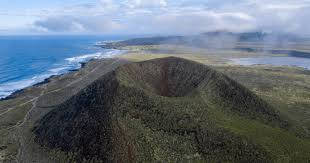
A hawk flies from the Earth to the moon! Yes, really! In its ten to fifteen year lifespan the red-tailed hawk will fly 238,855 miles, the distance from here to the moon. How do we know that? Today I’m meeting Mirna Borr to understand why it is actually important to know about the hawk and be amazed by the very idea of these airborne creatures as part of our village too. This interview with the Community Outreach Officer from Terra Peninsular will broaden our ideas about how we are interconnected to everything we encounter as we travel the wonder of Baja California. As the saying goes it takes a village to create a better future. We tend to have an idea of what comprises a village or community, seeing it limited to family and neighbors.
Terra Peninsular is a non-profit organization in Ensenada committed to conserving the natural beauty of Baja California since 2001. It has been faithfully led by Executive Director, Cesar Guerrero. The volunteers are vision-holders who work tirelessly to educate communities on the importance of protecting and managing the natural resources. The non-profit group focuses their passion on sustainability and compatibility with the ecological system that has been in perfect balance since the peninsula fractured off from mainland Mexico and rose from the sea millions of years ago. With the growing human population it is important to understand why we need to care.
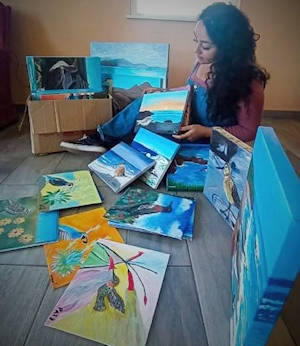
I wave to Mirna across the shaded patio. She is a beautiful woman with thick dark hair and eyes that hold a vision of hope. We order our espresso and cappuccino, catching up since we last saw one another. I wanted to hear of her latest travels to San Quintin where much of the conservation focus is at this time. I asked her to explain why it is important for us to know how far the red-tailed hawk flies in a lifetime. “It’s a long story,” she said. “When I started working with Terra Peninsular in my first year I was sent to Alaska to learn how to organize for our Annual Bird Festival here. It was there I learned about how that community was very connected and cared about the richness of their land. I saw that in San Quintin people don’t have an idea about the greatness of the land. It was in Alaska that I heard the story about the red-tailed hawk. It was very shocking to me to realize that the birds I was seeing here in Alaska migrated to San Quintin, and I had actually followed them in my travels. I learned so much how to engage people and how to work with the community to connect them with the land and the birds. When I returned, I began to plan the 4th edition of our bird festival in San Quintin.” Mirna was clearly excited about her work, “I saw that the local people here had no interest in birds. They didn’t understand how important it is to learn about the habitat and how to protect it. The plants are part of this interconnection and without them the birds and many other rare species would not survive. It is so important to understand this.” Mirna rushes on to explain how their outreach program is working. “We have designed hiking trails so we do not trample the plants. We point out this red flower and say that it is special to the hummingbird that flies all the way from San Quintin to Alaska!” She grins and says, “They are amazed and exclaim, really?! She goes on to say that there are different kinds of hiking trails to explore the volcano area as well as the wetlands. It is deeply gratifying for all the members of Terra to see the changes in the community getting more involved.”
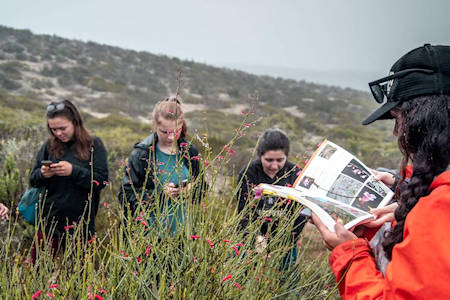
Mirna shares a perfect example of the power of understanding nature and its far reaching effects, “A mother shared her story with me. She noticed that her boys chased the birds, throwing rocks at them to watch them fly, and at times successfully hitting them. The family came to one of the bird festivals and was told how to watch and identify the birds. Eight year old Santiago won the prize for his bird watching marathon success. The prize was a pair of binoculars and a bird guide. Today he leads other children out for bird watching.” She goes on to say, “The women of the community can now recognize the birds by name and are excited to report seeing the especially rare ones.” Mirna points out, “People now understand that the special plants in the wetlands promote a healthy environment in which the birds flourish and sustain other animals and insect life while promoting clean air that is in perfect balance, if not interfered with.” Mirna expresses wonder, “We have created a whole new thing! We have a boom of recreational visitors to the area for hiking, kayaking, and surfing. The people have found this wonderful protected area. This is changing the attitude in the town, because it is bringing more visitors who go to the restaurants and more places to eat are opening. The town is now participating in guiding people to treat the environment with care and being responsible.” Amused she continues, “It’s great and the guides are asking about how they can get their certification, because their clients want to know about the ecology and the names of the birds. Now we are starting workshops to educate the local guides.”
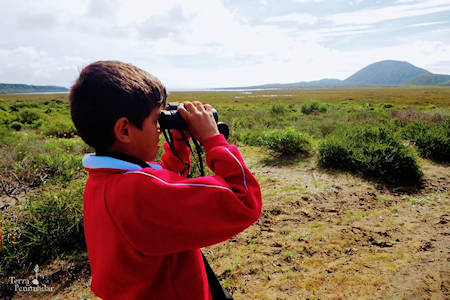
I was curious about how Mirna found her way into this unique work. She has lived in Ensenada her whole life and was attracted to an education in research and mass communication in documentaries. This was well before anyone was interested in environmental sustainability. “I was so fortunate to have Professor Anna Sanchez, an amazing woman, and together we planned projects for public knowledge.” After graduation, Mirna’s first project was with the fisherman of LA Bay. I mentioned it must not have been an easy task to try and change the old fishing habits. Each job after graduation was a step towards her vision that led to the opportunities with Terra. I said, “So you are planning a trip back to Alaska? Do you feel like one of the migrating birds?” She exclaimed, “Yes, yes! I feel I am in the first step of my life’s journey and it is important that I acknowledge this, because just two years ago, I felt I had to go back to school and learn all the science to fully understand. But then I realized people don’t need to know all that. They don’t need the scientific name of the plants; they just need to know that the red color of a flower is important to the hummingbird and that hawks can fly to the moon.”
Near the end of our visit Mirna wanted to speak about Terra Peninsular, “Claudia is my boss, she is an amazing person and we are a great team. We gather all these ideas and have created art shows displaying the painting of the bird life. It makes me feel very connected.” Pride is heard in her voice, “The people of Terra Peninsular have the same passion that I have, and it is amazing for me to experience the trust we have for one another. This is not like a normal organization. It has a powerful force working with a lot of love, inspiration and hope which promises to keep the beauty of the reserve for future generations. It is very human.” As I watched her walk away, I knew that she was one of the Mexican young people who are the future of their country.
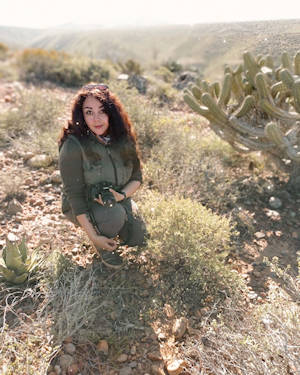
For more information you can go on line to Terra Peninsular’s Mediterranews Magazine published every two months about their ongoing work. In part it will help the traveler begin to investigate this rich resource as a destination. There are two areas that are now federally certified for visitation. Punta Mazo and Monte Ceniza Reserves are at this time destinations for kayaking, surfing, hiking to the volcanoes in the 130,000 acres of reserve. Monte Ceniza has cabins for rent. Not to be missed on their YouTube channel is a virtual tour as well as Field Notes Wetlands espisode #1 and Flora episode #2. The photography is spectacular of this unique paradise.
Around the world the wetlands are being reduced as they face threats of pollution, artificial filling for buildings and industrial waste. All this is loss of habitat which brings instability for all creatures including us, because we are all interconnected. Being informed is the turning point, like Santiago who no longer throws rocks at the birds, but now leads children to appreciate them, we can become a guardian and Terra Peninsular can show the way.
Terra Peninsular
Website | YouTube
Cabin reservations | turismo(at)terrapeninsular.org
Ensenada Office | Calle Tercera 1282 Zona Centro, C.P. 22800
Hours | Mon-Fri 8:00 a.m. a 4:00 p.m.
Phone | 646 177 68 00 / 646 174 02 86 / 646 248 41 00
Martina's email: mteomaya(at)gmail.com

Easy to work with 😉. Always courteous and helpful. Have used them for all trips to Mexico. Easy...

What a great experience out of a horrible one. I recently purchased insurance through Baja Bound...

I absolutely love this company and site! We travel frequently between Arizona and Puerto Penaso,...